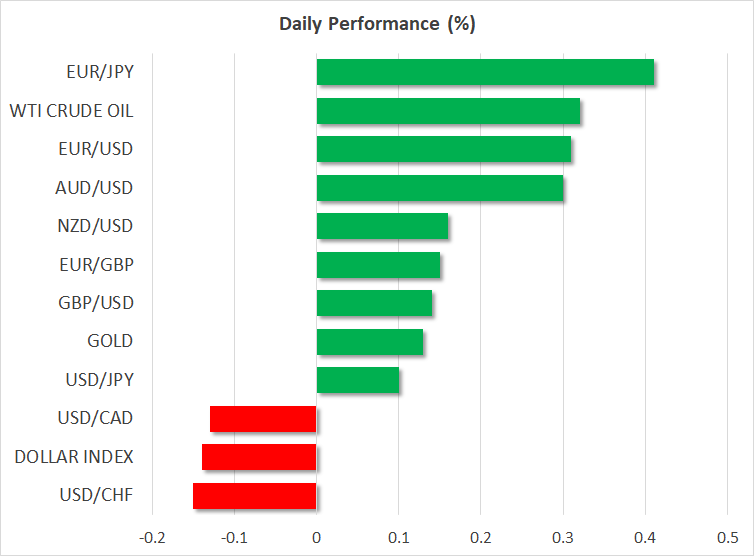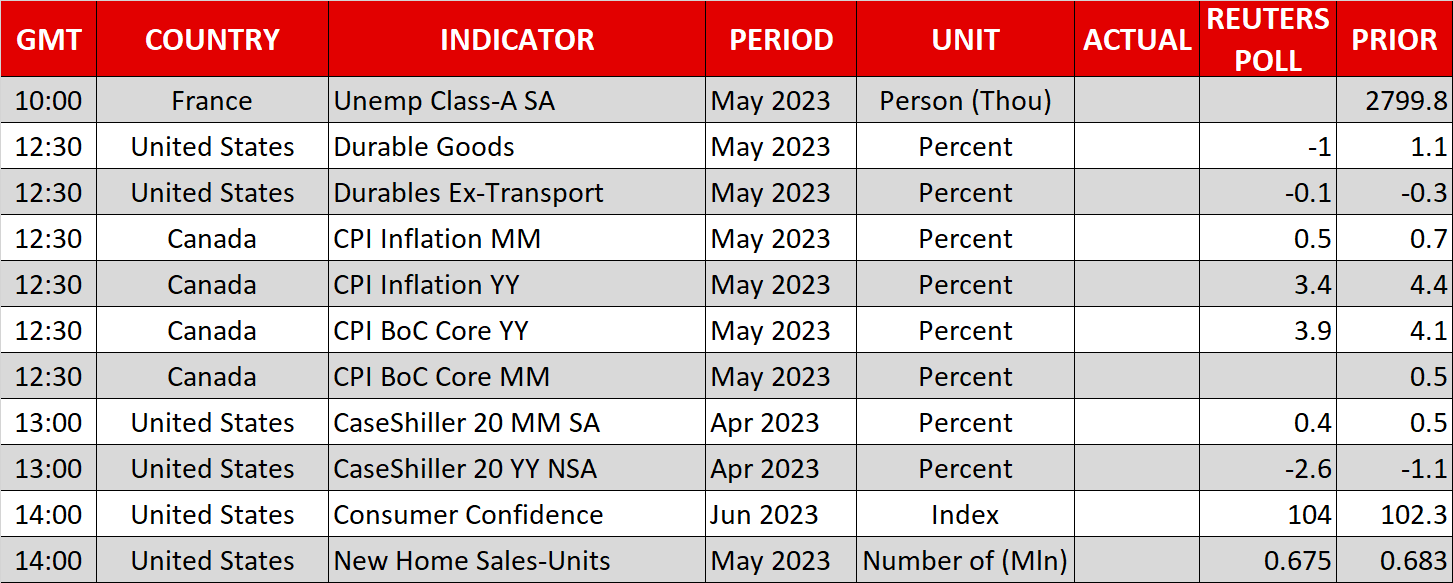- Yen gets hit by another selling wave, retests its multi-year lows
- Dollar slightly softer ahead of US releases, euro capitalizes
- Tech stocks encounter some profit-taking, ECB forum begins

Japanese yen can’t catch a break
It was a relatively quiet trading session in the FX complex on Monday. Investors appeared reluctant to make any big moves with geopolitical tensions simmering, preferring to bide their time until the dust around Russia’s coup attempt settles.
Defensive assets such as gold and bonds attracted some safe haven flows early on, alongside currencies like the Japanese yen and the Swiss franc. However, these moves were relatively small and ultimately retraced as the session progressed, once it became clearer that the situation in Russia was stable.
The yen has resumed its downtrend and is currently trying to breach its multi-year lows against the euro and pound, as the capital exodus from Japan continues unabated. Increasingly stronger threats of FX intervention by the vice finance minister have fallen on deaf ears, and signals that the Bank of Japan might raise its notorious yield ceiling next month did not have much impact either.
Traders are probably correct that the chances of direct FX intervention are low, something reflected in subdued implied volatility measures for the yen. Yet the prospect of a BoJ move next month has become increasingly realistic as core inflation is running above 4%, and markets seem to be sleeping on this risk judging by the slow grind lower in Japanese yields. In this sense, the inflation stats from Tokyo on Friday will be crucial for yen crosses, since they could trigger a reality check.
Dollar takes step back, euro benefits
Meanwhile, the dollar is trading a touch lower on Tuesday, without any clear catalyst behind the retreat. The dollar’s lackluster performance over the past month is rather striking, considering that this was a period when markets recalibrated the Fed’s rate path higher, scaling back bets of any rate cuts this year.
It is even stranger that the euro has been so strong in June, despite incoming signs that the Eurozone economy is losing steam at an uncomfortable pace. The ECB raising interest rates and telegraphing more to come certainly helped boost the single currency, but ultimately, capital doesn’t flow into struggling economies.
Instead, the moves over the past month might be better explained through the lens of risk sentiment. With stock markets going on a furious rally spearheaded by tech shares and implied volatility collapsing, an aura of increased risk-taking has spilled over into the FX market, keeping the dollar under pressure but benefiting risk-sensitive currencies like the British pound.
In other words, it seems that the stock market is the captain of the ship for now, so any serious correction in high-flying tech shares could have severe implications for other asset classes too.
Nasdaq drifts lower, upcoming data, ECB forum
This correction may have already started. The Nasdaq fell sharply yesterday to close 1.2% lower, as some air came out of the tech rally.
However, this retreat might be linked to quarter-end rebalancing flows and some profit-taking after such a monster bull run, rather than any massive reassessment about the future of tech giants.
For now, investors are happy to turn a blind eye to expensive valuations and stagnant earnings growth, although this mindset could change in a hurry if liquidity begins to dry up later this year.
As for today, there’s a barrage of data releases from the US that includes durable goods orders, new home sales, and consumer confidence metrics. In Canada, the loonie hit its highest levels in nearly 10 months today and the upcoming inflation report will decide whether this rally still has some miles left in the tank.
Finally, the ECB’s forum on central banking will kick off today and will feature several key speakers in the coming days, although this event is usually more academic in nature. 
